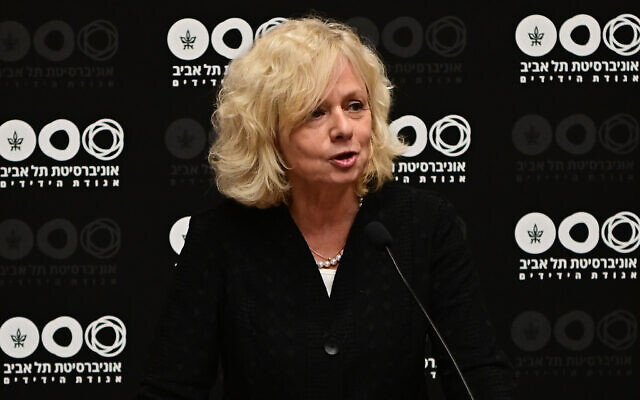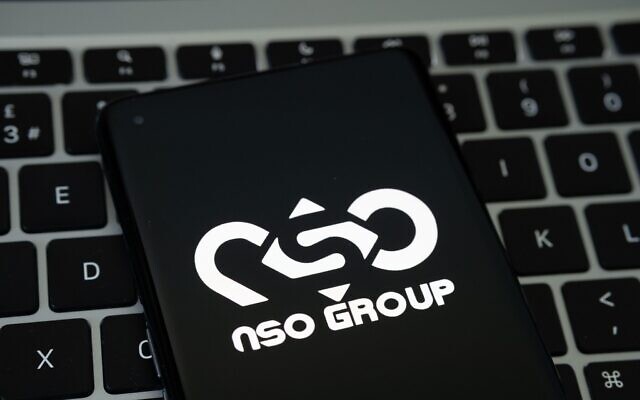Attorney General Gali Baharav-Miara on Thursday gave permission to police to use the controversial Pegasus phone spyware tool as they investigate the shooting of five members of an Arab family in a suspected gangland slaying.
Baharav-Miara permitted the use of Pegasus to listen in on conversations but prohibited investigators from drawing data from devices, a capability the spyware also has.
Her okay came as the government was set to form a committee to examine law enforcement’s use of spyware technology in the wake of a scandal that broke out in 2022 over police usage of sophisticated cellphone hacking technology to obtain access to citizens’ devices. An inquiry found that nearly all cases of use were court-approved, but that police had overstepped the bounds of their permits in a number of cases. The use of spyware by police has been largely frozen since then, except in certain cases and with the approval of the attorney general.
A senior police official told Haaretz that use of the spyware was needed in the current case for “immediate life-saving” action, amid concerns that the shooting Wednesday will lead to further violence.
Five members of a single family were killed in a shooting inside a house in Basmat Tab’un, a Bedouin village in the north, around 22 kilometers (14 miles) east of Haifa.
Police were looking into possible links between the killings and another shooting, earlier in the day, when a man was gunned down in broad daylight in Haifa, after apparently being mistaken for a relative involved in a criminal feud.

Attorney General Gali Baharav-Miara speaks at Tel Aviv University, September 28, 2022. (Avshalom Sassoni/Flash90)
Police chief Kobi Shabtai arrived at the scene of the mass shooting in Basmat Tab’un, with National Security Minister Itamar Ben Gvir joining him.
In a video statement from the scene, Shabtai called the shooting one of the “most abhorrent events we have ever encountered — a targeted elimination of an entire family that was apparently in response to a killing in Haifa this morning.”
Wednesday’s deaths brought the number of victims of homicides in the Arab community to 188 since the start of the year, compared to 80 during the same period in 2022.
The killings are part of a violent crime wave that has engulfed the Arab community in recent years. Many community leaders blame the police, who they say have failed to crack down on powerful criminal organizations and largely ignore the violence. They also point to decades of neglect and discrimination by government offices as the root cause of the problem.
Authorities have blamed burgeoning organized crime and the proliferation of weaponry, while some have pointed to a failure by communities to cooperate with law enforcement to root out criminals.
Ben Gvir, who is responsible for the police force, has also faced criticism that he is not doing enough to curb the violence.
In August, the government approved establishing a committee to investigate police use of spyware technology, in line with a request by Justice Minister Yariv Levin and in defiance of the attorney general’s opinion. Former senior security officials, including a former head of the Shin Bet security service, have petitioned the High Court of Justice against the establishment of the committee.
Shin Bet and National Security Council officials previously cautioned the government that such an inquiry could leak operational secrets.
Police are said to have access to a watered-down version of Pegasus spyware, known as Saifan, which allows them to access Israelis’ phones. It was not clear from reports if Baharav-Miara’s approval was for the use of Pegasus or Saifan.
Pegasus is made by Herzliya-based spyware firm NSO Group which has been on a US government blacklist since last year.
The firm’s flagship spyware is considered one of the most powerful cyber-surveillance tools available on the market, giving operators the ability to effectively take full control of a target’s phone, download all data from the device or activate its camera or microphone without the user knowing.
The company has been under fire over the alleged use of its spyware technology by authoritarian regimes to carry out human rights abuses. It insists its product is meant only to assist countries in fighting crime and terrorism.


